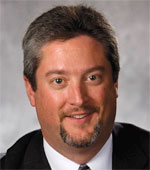 Timothy Myers
Timothy MyersYou’ve no doubt heard people talk about their mentors or read articles about how wonderful it can be to have one. But how can little old you, just now graduating from RT school, expect to find one of your own? And if you do, what can you expect that mentor to do for you?
In the following interview, AARC Associate Executive Director, Brands Management Tim Myers, MBA, RRT-NPS, FAARC, answers those questions and more—
Why is it important for new RTs to seek out a mentor?
Tim Myers: Health care in general, and respiratory care specifically, are rapidly changing environments. The profession of respiratory care offers so many diverse opportunities across the spectrum of care that there is a necessity to constantly learn and improve one’s knowledge, skills, and attributes as a respiratory therapist. Regardless of the respiratory care education program you attended, the didactics acquired in the classroom and even in clinical rotations are only like the foundation of a home, the sturdy structure on which to build. A new therapist’s selection of a mentor is incredibly important and rewarding when it comes to advancing your knowledge and skill set in a dynamic environment.

Where can people go to look for a mentor?
Tim Myers: Selecting the right mentor is critical to the therapist’s ability to develop and grow exponentially in the profession. While there is no magic answer, there should be an abundance of mentors in close proximity to most new graduates. It may be a faculty member in your education program or a clinical instructor. It oftentimes is a peer or supervisor at your place of employment. Talking with other recent graduates or hires about a “good mentor” may lead you to the right person.
The other option lies in the respiratory care “networks” available to us today. These can be local, regional, or even national venues ranging from conferences and meetings to reliable “digital networks.” Like anything else on the Internet, some of the latter are good, some are okay, and some may be less than desirable and without personal contact; these can be harder to actualize at times. From a personal bias standpoint, I believe joining and maintaining membership in the AARC is the way to go because our 48,000+ members offer a great variety of skill sets and encompass some trustworthy and proven mentors.
What are some of the specific things people should look for when finding the right mentor for them?
Tim Myers: Without a doubt, the key attribute is “selfless.” To be an excellent and beneficial mentor, one must be willing to give his commitment and time unconditionally to the mentee. The process is ALL about the mentee and not the gain or benefit of the mentor. What are the other qualities one should look for in an “ideal mentor”? Collaborator, team player, excellent communicator, experienced clinician, and knowledgeable educator and instructor come to mind. Oftentimes, these qualities and abilities are not found in just one person. That is why it is important to develop, maintain, and grow a reliable mentoring “network.”
A lot of folks don’t feel comfortable approaching someone about becoming their mentor. How can they get over that basic fear?
Tim Myers: At the end of the day, what do you have to lose? The ability to communicate and ask questions in the health care setting is a key attribute of a therapist who has the willingness to learn, grow, and eventually prosper. It portrays a willingness and humble mentality that you want to be the best that you can be and have a high interest in providing the higher quality, effective, safe care to the patients and families that your employer is entrusting to you. An age old proverb states that the “dumbest question you can ask is the one you don’t ask to begin with.” Lay those fears aside because health care in the 21st century is about collaboration, communication, and teamwork.
What should people expect from their mentor—and perhaps equally importantly, what should they not expect their mentor to do for them?
Tim Myers: Selflessness—the willingness to share without expectations of a return on investment from the mentee. That being said, the mentee must be humble and ask for the right information and assistance from the mentor without monopolizing her time. Good mentors will not offer the answers or the solutions all the time. Their role is to make the mentee think critically and work through the options and scenarios reflected by the questions they ask. Expect to learn from your mistakes, as a good mentor will allow you the freedom to make them on occasion if they are low risk in nature. We all learn from our mistakes and hopefully grow from them in the future. The final expectation is to expect—and possibly demand—honest open feedback and constructive criticism when you miss the mark or make the wrong call.
Mentoring is really a two-way street—what do new grads need to know about their own role in making the mentoring relationship work to their best advantage?
Tim Myers: Be open and honest not only with your mentor, but with yourself going into and throughout the process. And realize that, at some point in time, we ALL grow comfortable and perhaps complacent with our mentor relationship. When this happens, both parties need to clearly understand the “baby bird” is ready to leave the nest and find the next mentoring relationship to provide him with the ability to move to the next level. In my 25 year career, I can honestly say that I have probably had 12–18 mentors from all different disciplines in the health care setting.
Which leads to a final comment—no matter the experience, tenure, or accolades of any given therapist over a period of time, the necessity to find that next mentor is always there.





